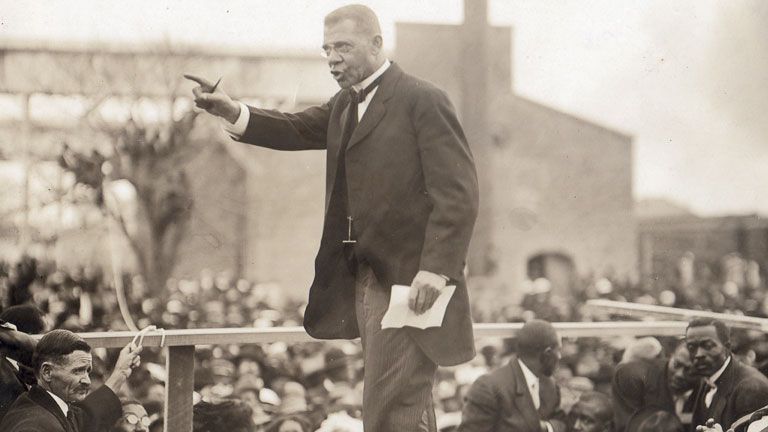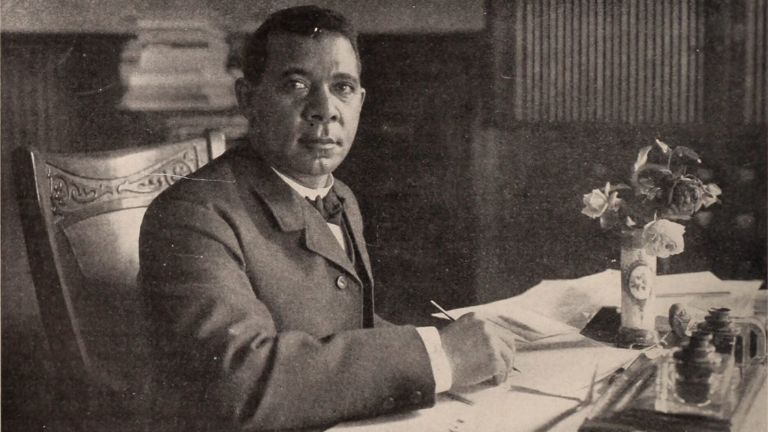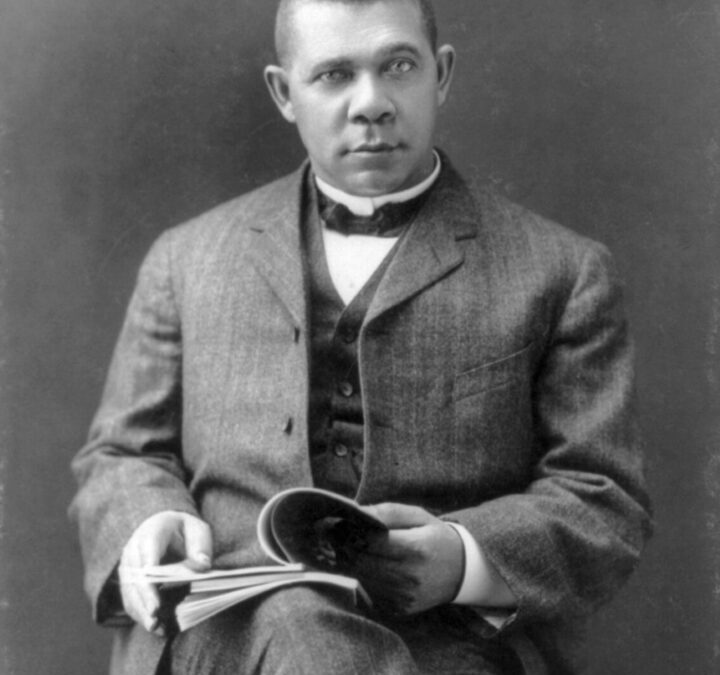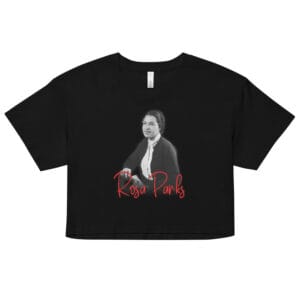When you travel around this great nation, it’s no accident that you’ll see many schools bearing the name of Booker T. Washington. That’s because this great black educator and leader set the standard and charted a new course in the years after the fall of slavery to lead his people to a better way. He showed his people the path to education, achievement, success and prosperity that flows naturally from these goals.

Booker T. Washington was one of the most influential people in American history. He was a great civil rights activist, teacher, orator and businessman. He was also one of the most controversial figures in American history. Here’s an article on the 8 things you need to know about Booker T. Washington.
Who was Booker T Washington?
Booker Taliaferro Washington was born on April 5, 1856, and was an educator, author, orator and advisor to the presidents of the United States of America. Washington was born into slavery in Virginia, the son of a slave mother and her white owner, James Burroughs, who gave young Booker his surname. After emancipation, Washington worked at the Hampton Normal and Agricultural Institute and attended college at Wayland Seminary in Washington, DC.
Washington founded the Tuskegee Institute, a private black college, in Alabama in 1881. Washington became the dominant leader of the black community in the South and one of the most prominent African-Americans of his time. He headed the National Negro Business League and founded Negro History Week.
Booker Taliaferro Washington became an advisor to Presidents Theodore Roosevelt, William Howard Taft and Woodrow Wilson.
Washington campaigned for racial equality for African-Americans in the South and for civil rights for African-Americans in the United States until his death on November 14, 1915.

Booker T Washington’s childhood
Booker Taliaferro Washington was born a slave on April 5, 1856, on a plantation in Franklin County, Virginia, to Jane, a slave owned by James Burroughs, and his father, Booker Taliaferro, a white man who was a carpenter. Although it’s often said of Washington that he was born into slavery, technically, he was born a slave.
As a child, Washington worked in the fields and slept in the same quarters as his enslaved parents. He never had enough to eat or warm clothes to wear. A cruel foreman once punished him by making him wear a heavy wooden yoke around his neck. He eventually escaped this cruel life on the plantation by attending the Normal and Agricultural Institute in Hampton, Virginia.
Slaves were treated differently from freedmen who had been slaves. Slaves were considered property and passed from one owner to another. Freedmen were legally considered their own person. After the Civil War, the difference between a slave and a freedman was essentially a matter of semantics. Washington was born a slave, but was freed when slavery was abolished. He was held in high esteem by his owner, a member of the white elite, who considered him superior to other slaves. Indeed, Washington was light-skinned, much taller than most slaves and also highly intelligent.
Booker T Washington’s upbringing
His father, James, was a white slave owner, more than twenty years his wife’s senior, who was said to be one of the most lenient owners in the region. He, his wife and their son Booker lived in a large house, had numerous servants and slaves, and his wife was never required to work in the fields. Despite this, Booker’s mother, Jane, was a stern and strict woman who worked as hard as any farmhand and was determined that her son would not suffer the indignities and poverty of slavery.
Booker’s mother, Jane, came from a free black family in Virginia, and she insisted on giving her children an education. Booker learned to read and write at home. He also went to school for three years, where he was not encouraged to learn much. At fourteen, Booker began working full-time on the farm. He developed a particular talent for handling horses, which he used to help his father and neighbors. But Booker isn’t content to spend his life on the farm. He dreams of going to university and becoming a teacher.
Booker’s mother and grandmother taught him to read and write before he entered school, and he was soon able to read the Bible. Booker was nine years old when the Civil War ended and he was released. He spent a year at Hampton Normal School in Virginia, a school designed to teach former slaves. He wanted to go to Hampton Institute, but his family couldn’t afford the cost. In 1872, he accepted a teaching position at the Institute.
But it wasn’t just academic success that marked Washington’s career. He distinguished himself in many areas of leadership, becoming the spokesman for post-slavery black America to the powerful and influential in this country. Book T. Washington lived the concept that the pen is mightier than the sword, and was an early voice for moderation and learning to excel within America’s institutions and customs rather than resorting to violence.
See also our article: The history of Juneteenth celebrations
Booker T Washington’s marriage and family
For most of his life, he was known as Booker T. Washington. The exact date of his birth is unknown, as the plantation where he was born had no official record of the event. However, according to his autobiography, Washington’s mother chose to throw a party for him on April 5, after beginning to suspect that he might have been born on that day. The exact year of his birth is also controversial. Washington claimed to have been born in 1856, but historians and biographers have since suggested that the true date was between 1859 and 1861.
Booker T Washington married Helen Amelia Arnold, daughter of the president of the Bank of Albemarle, on August 9, 1881. Their marriage lasted until her death in 1915. They had five children together: Portia (b. 1882), Ernest (b. 1884), Eulalie (b. 1887), Helen (b. 1889) and Booker T. Washington Jr. (b. 1892).
One of Washington’s great strengths was to find partnerships and coalitions between leaders of many communities to improve educational opportunities and excellence for the African-American community of the time. One of the most influential speeches in black history was delivered by Washington and became known as the Atlanta speech of 1895, in which Washington, addressing a predominantly white audience, instigated a profound change in the way economic opportunity and hiring was done in America at that time. In this speech alone, he…
* He called on the black community to become part of the American economy and industry, beginning the healing process that was so necessary at the time.
* He declared unreservedly that the South was the region of the country with the most employment opportunities for blacks. By uniting the strong black workforce with a recovering economy after the Civil War, Washington was perhaps one of the principal architects of the South’s recovery from the ravages of that war.
* He made it clear to the country’s predominantly white-led economic institutions that it made more sense to tap the large resident black population for reliable workers than to turn to immigrants. The result was an employment boom for the black community, which represented a huge leap forward in the struggle to emerge from slavery.
The Atlanta speech of 1895 propelled Booker T. Washington to national prominence, becoming a calming voice and a powerful catalyst for change in this country. Through his sophisticated network of supporters from all spheres of power, including political, academic and business leaders, Washington worked tirelessly to bring hope and new opportunities to black families trying to make their way in America.
His work ethic was profound and produced change at a phenomenal pace. But Washington paid a heavy price and died relatively young, at the age of 59, of exhaustion and overwork. But it also highlights the extraordinary energy and dedication this important black leader showed in using all his talents, intelligence and contacts to improve black lives and accelerate the path to acceptance and integration across America.
We all owe Booker T. Washington a great deal of gratitude for being the « man of the moment » who moved all people, black and white, forward to find ways to work together in partnership rather than distrust or violence, to achieve a better America for all.
Booker T Washington was one of the most important figures in American history. He was a great civil rights activist and a great man.










